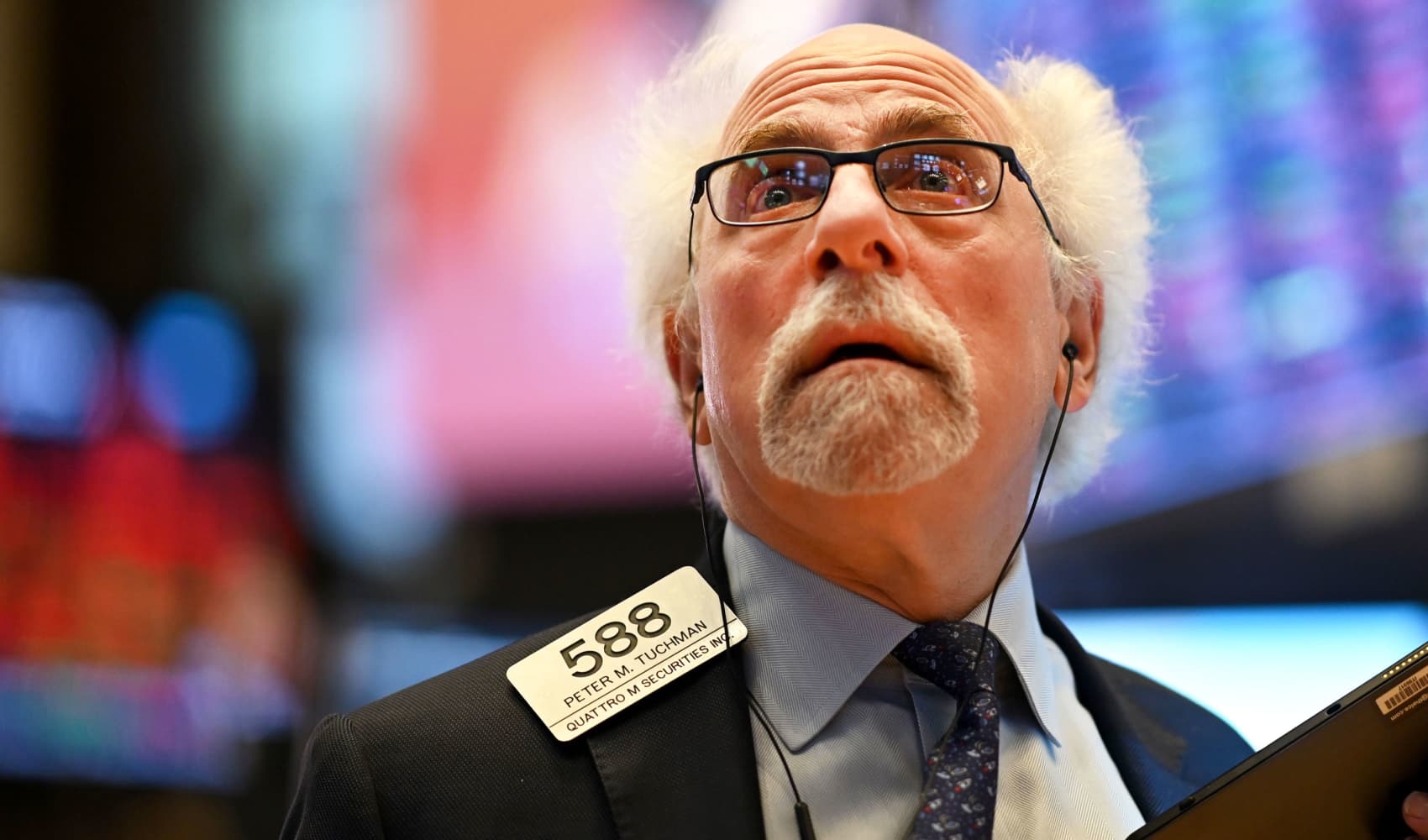
- Swiss regulator FINMA announced that the AT1s, widely regarded as relatively risky investments, will be written down to zero, while stock investors will receive payouts as part of the takeover.
- California-based global litigation firm Quinn Emanuel Urquhart & Sullivan announced on Monday that it had put together a "multi-jurisdictional team of lawyers from Switzerland, the U.S. and the U.K." to discuss "possible legal actions" with Credit Suisse bondholders.
A number of Credit Suisse bondholders said Tuesday that they were considering legal action after $17 billion of the bank's additional tier-one (AT1) bonds were wiped out as part of its emergency sale to UBS.
Swiss regulator FINMA announced Sunday that the AT1s, widely regarded as relatively risky investments, will be written down to zero, while stock investors will receive payouts as part of the takeover, angering bondholders.
David Benamou, chief investment officer at Axiom Alternative Investments and a holder of Credit Suisse AT1 bonds, told CNBC on Tuesday that he would be joining the lawsuit along with, he imagined, "probably most bondholders."
Feeling out of the loop? We'll catch you up on the Chicago news you need to know. Sign up for the weekly Chicago Catch-Up newsletter here.
California-based law firm Quinn Emanuel Urquhart & Sullivan said Monday that it had put together a "multi-jurisdictional team of lawyers from Switzerland, the U.S. and the U.K." following the rescue deal.
"That team are already in discussions with a number of holders of Credit Suisse's AT1 capital instruments, representing a significant percentage of the total notional value of AT1 instruments issued by Credit Suisse, about the possible legal actions that may be available to them in light of the announcement of the merger between UBS and Credit Suisse," the firm said.
The firm previously represented bondholders following Spanish bank Banco Popular's sale to Banco Santander for 1 euro in 2017, which also saw AT1s written down to zero.
Money Report
The firm said it was planning to convene a call for bondholders on Wednesday to talk through "potential avenues of redress."
Was Credit Suisse failing?
Ordinarily in the event of a bank failure, AT1s — also known as contingent convertibles or "CoCos" — would be prioritized above equity holders.
The bonds were created after the Global Financial Crisis as a means of diverting crisis risk away from taxpayers. The Credit Suisse write-down represents the largest loss ever inflicted on AT1 investors since their inception.
The decision by Swiss authorities to upend the long-established norms and hit AT1 bondholders over equity investors has been criticized for damaging confidence in the asset class, potentially creating a spillover effect in global markets
The ECB Banking Supervision authority, Single Resolution Board (SRB) and European Banking Authority (EBA) issued a joint statement Monday seeking to reassure investors that the Credit Suisse deal is a one-off. Switzerland is not part of the European Union and so is not subject to the bloc's regulations.
"In particular, common equity instruments are the first ones to absorb losses, and only after their full use would Additional Tier 1 be required to be written down," the EU authorities insisted.
"This approach has been consistently applied in past cases and will continue to guide the actions of the SRB and ECB banking supervision in crisis interventions. Additional Tier 1 is and will remain an important component of the capital structure of European banks."
As of the end of 2022, Credit Suisse had a common equity tier one (CET 1) capital ratio, a measure of bank solvency of 14.1% and a liquidity coverage ratio of 144%. These figures suggest that the bank was solvent and had ample liquidity, leading Axiom's Benamou to question whether the bank should be deemed "failing" in the traditional sense.
The bank lost the confidence of investors and depositors over the last two weeks, resulting in a freefalling share price and massive net asset outflows, and FINMA specified Sunday that there was a risk Credit Suisse could become illiquid, even if it was not insolvent.
Political backdrop
One of the catalysts for Credit Suisse's most recent share price capitulation was the announcement from top investor the Saudi National Bank that it would not be able to offer any further financial assistance.
The acquisition of its 9.9% stake in October played a large part in funding Credit Suisse's massive strategic overhaul, while the Qatar Investment Authority became the bank's second-largest shareholder after doubling its stake to 6.8% late last year.
Asked if he thought there was political motivation behind the decision to secure the shares before AT1 bondholders, given the scale of Credit Suisse's anchor shareholders, Benamou said that was the "only logical explanation."
A spokesperson for FINMA was not immediately available for comment.
Credit Suisse's AT1 bonds offered higher yields than many comparable assets, in some cases yielding almost 10%, reflecting the inherent risk investors were taking.
They also contained a clause enabling them to be written down to zero by Swiss authorities should the bank no longer be viable, regardless of whether stock holders were also wiped out.
Benamou acknowledged that the yield reflected the risk of failure or "non-viability," but dismissed the suggestion that the write-down was covered by the existing clause.
"In reality, they changed the law on Sunday to allow FINMA to write down the AT1 without any constraint. Of course, there is a degree of flexibility in the prospectuses but if they change the law on Sunday, it's because they didn't have enough flexibility to write down the AT1s to zero," he said.
However Mark Yallop, chair of the U.K.'s Financial Markets Standards Board and the former CEO of UBS U.K., told CNBC that it was plausible that FINMA took a "technical decision" based on its interpretation of the aforementioned write-down clause.
"This is a legal interpretation of that document and I'm sure it will be fought over in court in due course, but I think it's not right to see this as a political fix-up to suit certain equity holders, necessarily," he said.
"I think there is grounds to believe that FINMA probably felt that they were within their rights as it were to insist on this outcome."
British litigation specialists Stewarts suggested that far from being an "unjustified frolic," the Swiss regulator and relevant parties will likely have taken legal advice before wiping out the AT1 bondholders.
"Given the stakes, they may have considered that the risk of future litigation is better than the alternative, although there is some precedent in the 2017 takeover of Banco Popular by Santander organised by the ECB oversight unit when its AT1s were wiped out," the law firm said in a statement.
Some of Credit Suisse's shareholders have also reacted angrily to the authorities' use of "emergency measures" to rush through the deal without a vote.
Equity holders will only receive payouts at the value of the UBS buyout, a fraction of their value prior to the deal.
Vincent Kaufmann, CEO of the Ethos Foundation which holds more than 3% of the bank's stock, told CNBC on Monday that the organization would consult its lawyers on a possible legal action.
Ethos, which is comprised of 246 Swiss pension programs and public utility foundations, accuses Swiss authorities of using their emergency powers to pass two key pieces of legislation without shareholder approval.






